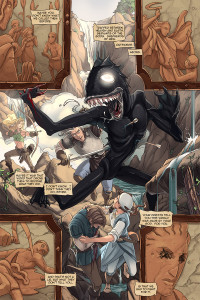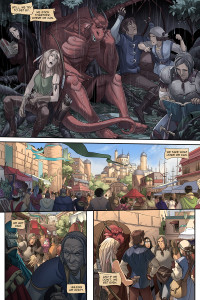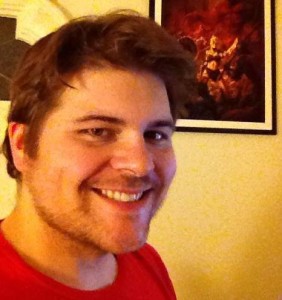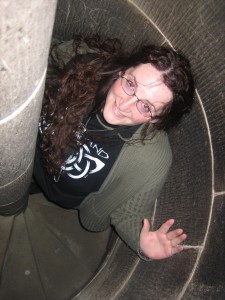A guest post by Sam Sykes.
The first rule of being a successful writer, as any author will tell you, is to write a good book.
Indeed, if you felt so inclined, you could call this the sole rule of being a successful writer. For if your book is even just pretty good, it will sell and your needs will be largely taken care of. And if your book is very good, it will likely sell very well and you’ll find yourself doing what all successful writers do, which is largely hiding in a dark room and weeping into a glass of whiskey as you struggle with the desperate self-conviction that you are a fraud.
While this is still technically possible, it’s much rarer than it used to be. Because it used to be quite common, with a fantasy author’s readership largely pre-defined as small, humble geeks who would buy whatever you put out because they were immensely starved for entertainment.
But it’s not quite the same anymore. There’s no  shortage of absolutely thrilling fantasy authors these days and the audience is much, much broader. The geeks are louder, more outspoken, more eager to be open with their passions. You see this scrawled out in events such as Comicon, where movie geeks, comic geeks and video game geeks all brush shoulders with your readership, the book geek.
shortage of absolutely thrilling fantasy authors these days and the audience is much, much broader. The geeks are louder, more outspoken, more eager to be open with their passions. You see this scrawled out in events such as Comicon, where movie geeks, comic geeks and video game geeks all brush shoulders with your readership, the book geek.
This is frequently the source of bemoaning the end to Comicon’s purity, but I view it as a good thing. To find a niche-specialized nerd these days is increasingly uncommon, as the more we brush against each other, the more our passions are shared. Suddenly, gamers are comparing the stories they play against the stories they read and comic book readers are keen to devour any story they can, be it illustrated or not.
This is the future. This is your audience. They are massive, they are multitalented and they are hungry.
And with a new, varied audience comes a new opportunity to draw in potential readers. While your book (undoubtedly very good) will be the thing to hold their attention and make them a fan, there are a number of ways you can draw people in.
One such means I found was in creating a comic book with the help of the tremendously talented artist, Ashley Cope, creator of the webcomic, Unsounded.
Set as a prologue to my newest book, The City Stained Red, due out in 2014 by Orbit Books, it’s a means of quickly and vividly conveying what my book is all about to an audience increasingly focused on absorbing information quickly through visual stimuli.
 That all sounds dreadfully scientific, perhaps even a little coldly mercenary. I assure you, though, that any thought and study as to the practical effects of this were an afterthought.
That all sounds dreadfully scientific, perhaps even a little coldly mercenary. I assure you, though, that any thought and study as to the practical effects of this were an afterthought.
Because I am one of the new nerds. And my first thought was for the simple fact that I freaking love comics and wanted to see my characters, my stories made into one.
Now, it’s certainly a good idea, from a business standpoint. It stretches across the medium to reach a new audience and it’s quick to be digested to hook new readers. So, if this sort of thing appeals to you, as an aspiring author, I’d like to offer you three tips as to how to make it work for you.
Let Enthusiasm Guide You
One of the big things you’ll learn about geeks is that they can smell crass corporate dictation. A lifetime on the internet has left them cynical and suspicious of anyone pretending to be like them. But this also means they are more easily infected by enthusiasm and passion.
Hence, be enthusiastic in all your side projects. Never do anything unless you’re excited about it. Never let yourself be dictated solely by business.
If you don’t understand comics and aren’t interested in them, it’ll seep through and alienate people. Likewise, if you’re absolutely mad about directing and cinematography, then putting together book trailers or short web videos to act as supplement to your books will draw people in.
Always Be a Professional
One of the biggest joys of this sort of thing is the creative collaboration between artists that occurs. I, for one, can’t draw with any great skill, and thus I sought out Ashley Cope (who can write with incredible vigor, how unfair is that). It was a tremendous joy working with her and learning how to let my thoughts be made into something illustrated.
I have an immense respect for artists. I’ve worked with several of them and I know, as I implore you now, that you must treat them well.
Always be respectful of their time; good artists are always in demand and have busy schedules. Always be prompt with payment; they work hard for you, you owe them the courtesy and the payment. Never be afraid to offer feedback; they’re interested in making the work come alive, not in having their butts kissed.
And never, ever, ever offer to “pay them in exposure.”
I will seriously kill you if you do.
Remember Rule One
Supplemental side projects are just that. They are only as strong as the story you’re going to write and it’s always going to be the story that holds the attention of your readers.
You can have the finest comic, the best trailers, the coolest web series around, but if it’s based on a crappy book, it’s not going to mean much.
Don’t get caught up in the excitement. Finish the book. Then make plans.
Good luck, and keep writing!

Sam Sykes is the author of The Aeons’ Gate trilogy, a vast and sprawling story of adventure, demons, madness and carnage. Suspected by many to be at least tangentially related to most causes of human suffering, Sam Sykes is also a force to be reckoned with beyond literature.At 25, Sykes is one of the younger authors to have arrived on the stage of literary fantasy. Tome of the Undergates and Black Halo are currently published in nine countries. He currently resides in the United States and is probably watching you read this right now.

